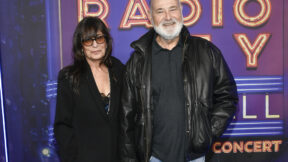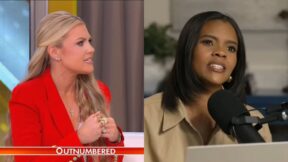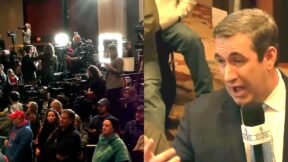Quentin Tarantino Expresses Remorse For Uma Thurman Crash: ‘The Biggest Regret of My Life’
Quentin Tarantino is known for his daring, provocative filmmaking, but he calls the choice to have a stunt performed by actress Uma Thurman a mistake.
“[It is] the biggest regret of my life,” Tarantino told Deadline. I told her it would be OK. I told her the road was a straight line. I told her it would be safe. And it wasn’t. I was wrong.”
He added that his relationship with Thurman thereafter was strained for a long time. “It wasn’t like we didn’t talk,” he said. “But a trust was broken.”
While working on Tarantino’s bloody thriller Kill Bill, Thurman was told to drive an unsafe car fast enough so that her hair would be blowing, and the direction of the drive was changed right before filming. The new route had not been tested, and Thurman ended up in a crash. She called the working conditions surrounding the incident “dehumanization to the point of death.”
Meanwhile, Tarantino maintains that he never forced Thurman to get in the car.
“It was just driving. None of us looked at it as a stunt,” he said. “Maybe we should have, but we didn’t. I’m sure when it was brought up to me, that I rolled my eyes and was irritated. But I’m sure I wasn’t in a rage and I wasn’t livid.”
Tarantino later released the footage of the crash to Thurman before she gave an interview to The New York Times‘s Maureen Dowd, which was denied her by Harvey Weinstein and other Miramax executives so that she couldn’t sue.
“There was an element of closure,” Tarantino said. “She had been denied it, from Harvey Weinstein, being able to even see the footage. I wanted to deliver it to her, so she could look at it. So she could see it and help her with her memory of the incident.”
Incidentally, audio of Tarantino defending Roman Polanski emerged on the same day as the crash footage and the allegations of putting Thurman in unsafe conditions. In the audio clip, from a 2003 interview with Howard Stern, Tarantino said that the word “rape” did not apply to Polanski’s sexual relationship with a 13-year-old in 1977.
“He didn’t rape a 13-year-old. It was statutory rape … he had sex with a minor. That’s not rape. To me, when you use the word rape, you’re talking about violent, throwing them down — it’s like one of the most violent crimes in the world,” he said. “Throwing the word rape around is like throwing the word ‘racist’ around. It doesn’t apply to everything people use it for … She wanted to have [sex]! Dated the guy!”
[image via screengrab]




